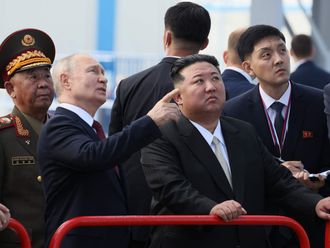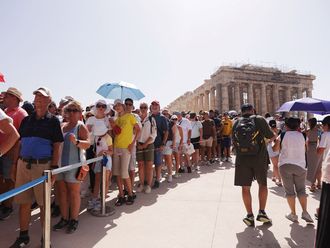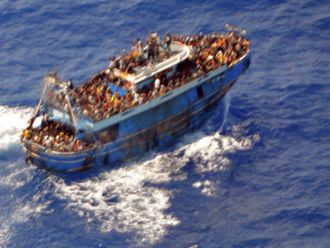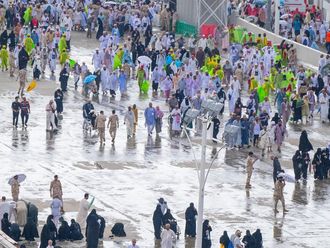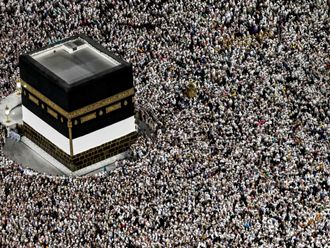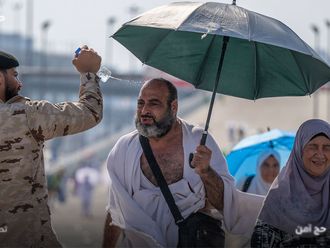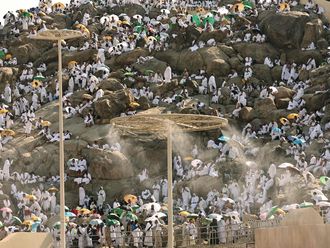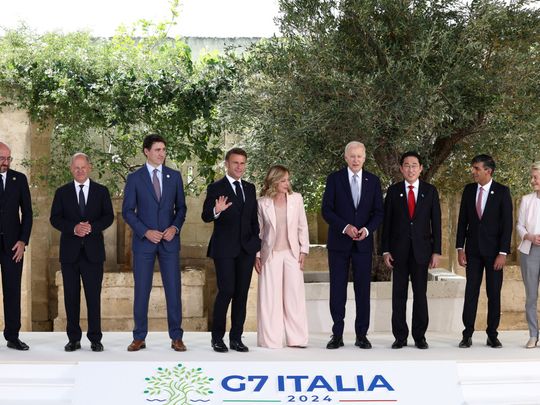
BORGO EGNAZIA, Italy: Leaders of the Group of Seven (G7) major democracies agreed an outline deal on Thursday to provide $50 billion of loans for Ukraine using interest from Russian sovereign assets frozen after Moscow launched attacks on its neighbour in 2022.
The political agreement was the centrepiece of the opening day in southern Italy of the annual summit of G7 leaders, attended for a second successive year by Ukraine’s President Volodymyr Zelenskiy.
The Ukrainian leader will sign a new, long-term security accord with US President Joe Biden on Thursday, as well as one with fellow G7 member Japan.
Many of the G7 leaders are struggling at home but determined to make a difference on the world stage as they also seek to counter China’s economic ambitions.
Also read
“There is a lot of work to be done, but I am sure that in these two days we will be able to have discussions that will lead to concrete and measurable results,” Italian Prime Minister Giorgia Meloni told her G7 guests as their talks started in a luxury hotel resort in the southern region of Puglia.
The G7 plan for Ukraine is based on a multi-year loan using profits from some $300 billion of impounded Russian funds.
The technical details will be finalised in the coming weeks, a G7 diplomatic source told Reuters. The source, who asked not to be named, said the additional funding would arrive by the end of this year.
A senior US official said the United States had agreed to provide up to $50 billion itself, but that amount could decline significantly as other countries announced their participation.
The aim of the deal was to ensure it can run for years regardless of who is in power in each G7 state - a nod to concerns that US Republican presidential candidate Donald Trump might be much less sympathetic to Kyiv if he beats Biden in November, according to a person close to the talks.
While Meloni is flying high after triumphing in weekend European elections, the leaders of the other six nations - the United States, Japan, France, Germany, Britain and Canada - face major domestic woes that risk undermining their authority.
MIDDLE EAST CONCERN
The G7 leaders also expressed their concerns about the situation on the Israel-Lebanon border and endorsed US efforts to secure a ceasefire in the Gaza Strip, according to a draft communique due to be released following the summit.
In addition, they called on Israel to refrain from a full-scale offensive in the southern Gaza city of Rafah, “in line with their obligations under international law”.
Western nations were also unanimous in their concern over China’s industrial overcapacity, which they say is distorting global markets, and their determination to help African states develop their economies, diplomats said.
The G7 may have a very different complexion next year.
Biden faces an uphill battle to win re-election in November, British Prime Minister Rishi Sunak looks certain to lose power at a national poll next month. French President Emmanuel Macron dissolved his country’s parliament on Sunday after his party was trounced in the European vote.
All smiled broadly as they greeted Meloni under a blazing sun at the entrance to the Borgo Egnazia resort where they will spend two days in sessions that will later be opened to a host of fellow leaders, including Pope Francis.
Eager not to appear like an elitist fortress, the G7 has thrown open its doors to a large number of outsiders this year, including the pope, who is expected to give a keynote speech on Friday on the risks and potential of Artificial Intelligence.
Among those who have also been invited to Puglia are the leaders of some of the biggest regional powers across the globe such as India, Brazil, Argentina, Turkey, Algeria and Kenya.
Although the summit is scheduled to run until Saturday, many G7 chiefs will leave on Friday night, including Biden, meaning the final day has been earmarked for bilateral meetings for those staying on and a closing news conference from Meloni.



